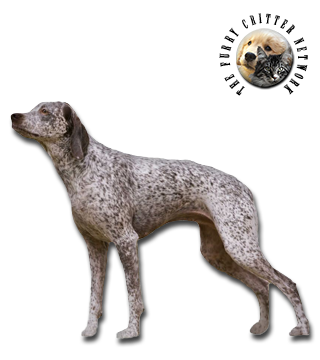Breed Standard
Head: Solid. Rounded skull. Slightly pronounced stop. Straight or slightly curved nosebridge. Strong, cone-shaped muzzle. Solid jaws. Nose the same color as the coat.
Ears: Hanging along cheeks, minimally curled, reaching slightly past the throat when outstretched.
Eyes: Large, hazel or dark amber, depending on coat color.
Body: Can be inscribed inside a square. Very open, muscular neck, slight dewlap tolerated. Pronounced withers. Broad, long, tall chest. Well-curved ribs. Loin short and broad. Flank flat, slight tuck-up. Back short, fairly level. Rounded, moderately sloping croup.
Tail: Set on fairly low, naturally short. Tail should be either absent or short (no longer than 15 cm)(6 in).
Hair: Short, fine, dense. Somewhat thicker and sometimes longer on the back.
Coat: Chestnut with patching, heavily to moderately spotted, hairs relatively mixed. As a whole, the coat may have a pale lilac cast.- Fawn with patching, heavily to moderately speckled, hairs closely mixed. As a whole, the coat mayhave a pale peach cast. Colored markings on the head, whether symmetrical or not, are allowed only ifthey are unobtrusive and if both eyes are not in the same spot.
Size: Dog: 51 to 57 cm (20-22.5 in).Bitch: 48 to 55 cm (19-22 in).
Weight: Dog: 18 to 25 kg (40-55 lb).Bitch: 16 to 22 kg (35-48,5 lb).
History
The Bourbonnais Pointing Dog was already known in the sixteenth century as a skilled quail hunter. He was described as hardy, born with a short tail and sporting a white coat speckled with fawn or covered or dotted with pale chestnut spots. The breed was fairly popular in the early twentieth century, but the two World Wars nearly spelled its end. A breed club was founded in 1925. Currently, breeders are working toward the survival of the breed.
Behavior
The Bourbonnais Pointing Dog is known for its gentle and affectionate nature. They are loyal and devoted to their families, making them excellent companions and family pets. Despite their strong hunting instincts, they are typically gentle and patient with children and other pets when properly socialized from a young age. They are intelligent and eager to please, which makes them relatively easy to train. They have a strong desire to work and excel in various canine sports and activities.
The Bourbonnais Pointing Dog is well-suited to active individuals and families who enjoy outdoor activities and can provide them with plenty of exercise and mental stimulation. They excel as hunting companions but also thrive as loyal and affectionate family pets. Their adaptable nature makes them suitable for various living environments, including both urban and rural settings, as long as they receive adequate exercise and mental stimulation.
Health
Overall, the Bourbonnais Pointing Dog is a healthy and robust breed with no major health concerns. However, like all breeds, they may be prone to certain genetic conditions such as hip dysplasia or ear infections. Regular veterinary check-ups, a balanced diet, and proper exercise can help ensure their well-being.






